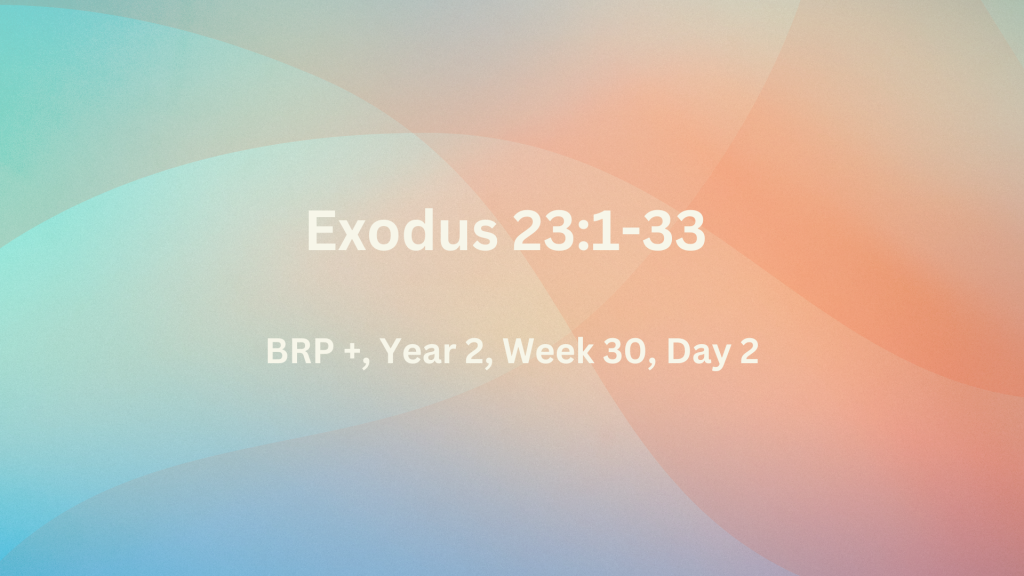Exodus 23:1-33
Q.1. How were the Israelites to relate to one another? Did this apply more broadly? What was the reason for resting the land? Who else was to benefit from the sabbath? – (Exo.23:1-13)
The Israelites were not to pervert the course of justice, by bearing false witness, taking a bribe, or giving in to popular opinion against the defenceless (Exo.23:1-3). This care was to be extended even to a person’s livestock (Exo.23:4-5). Lest a person was tempted to pervert justice, God warned – … I will not acquit the guilty (Exo.23:7). In their dealings with strangers, they were never to forget that – you yourselves know the feelings of a foreigner, for you also were aliens in the land of Egypt (Exo.23:9). Israel was to build a sabbath rest into its agricultural pursuits: This meant giving the land a break on the seventh year … and also giving their slaves and working animals a break on the seventh day. Thus, all the people were to be refreshed (Exo.23:10-12). It would help them to not turn to other gods but instead to keep their focus on the true and living God (Exo.23:13).
Q.2. How often were the Israelites to celebrate special festivals? What were they? With what were they to come? Why did God give them a guiding angel? How were they to follow the angel? – (Exo.23:1-23)
Israel celebrated seven annual festivals (Lev.23:1-44). However, three of these were obligatory for all the men of the tribes to attend. It was built into the annual religious life of all the tribes to give thanks to the Owner of the Land of Promise (Exo.23:14 & 17). The first was the Passover festival that led to the Feast of Unleavened Bread – 15 You shall observe the Feast of Unleavened Bread; for seven days you are to eat unleavened bread, as I commanded you, at the appointed time in the month Abib, for in it you came out of Egypt … (Exo.23:15). This fell in spring, after the barley harvest. The other two feasts are identified in scripture as the Feast of Pentecost, and the Feast of Tabernacles, when – you shall observe the Feast of the Harvest of the first fruits of your labours from what you sow in the field; also the Feast of the Ingathering at the end of the year when you gather in the fruit of your labours from the field (Exo.23:16). The Feast of Harvest (or Pentecost) was held 50 days after the Passover in summer and marked the completion of the wheat harvest. The Feast of Ingathering (or Tabernacles) fell in autumn after the completion of the grape and olive harvest. God commanded that – … none shall appear before Me empty-handed (Exo.23:15). Obedience would keep Israel worshiping their God. Blood was to be treated with respect (Exo.23:18). Not until the sacrifice of the blood of Jesus, would the atonement for sin be complete. (Heb.9:11-14, 22; 10:19-20; 1 Pet.1:18-19). God also gave the Israelites a healthy diet, by claiming the fat for Himself (Exo.23:18). Though He demanded the choice offerings of the first fruits for Himself, God was constantly thinking about Israel’s welfare (Exo.23:19).
Q.3. How would Israel conquer the nations of the Promised Land? What was the reward for obedience? Would Israel succeed immediately? Could they enter into covenants with the Canaanites? – (Exo.23:23-33)
Israel was on the way to a place God had prepared for His people (Exo.23:20 c.f. Jn.14:1-3). To ensure His plan to establish them in the Promised Land would not fail, God promised – I am going to send an angel before you to guard you along the way (Exo.23:20 & 23). They were to obey the angel of the Lord – for he will not pardon your transgression, since My name is in him (Exo.23:21). NOTE: There is good reason to believe this was a Christophany (an appearance of Christ in the Old Testament – (c.f. Gen.14:18-20; 18:22 & 33; 22:15-18 etc). Obedience to the Angel’s voice meant that – 22 … I will be an enemy to your enemies and an adversary to your adversaries. 23 For My angel will go before you and bring you in to the land of the Amorites, the Hittites, the Perizzites, the Canaanites, the Hivites and the Jebusites; and I will destroy them (Exo.23:22-23). God promised further blessings if Israel destroyed and refused to worship the gods of the land (Exo.23:24-28, 32-33). However, the conquest would be ‘little by little’, so the land was not overrun by wild beasts – until you become fruitful and take possession of the land (Exo.23:30 c.f. 23:29-30). God reiterated His promise to Abraham that – I will fix your boundary from the Red Sea to the sea of the Philistines, and from the wilderness to the River Euphrates; for I will deliver the inhabitants of the land into your hand, and you will drive them out before you (Exo.23:31 c.f. Gen.15:18-21). This tract of land is the land of Canaan bounded by the Red Sea, the Euphrates River, and the Mediterranean Sea. This was the territory of Israel under Solomon’s reign (1 Kgs.4:21-24; 2 Chron.9:26).

